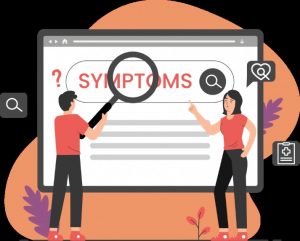Many individuals use ‘Dr Google’ to self-diagnose and seek medical assistance, but researchers warn that internet symptom checkers are only correct about a third of the time.
The latest study, which was published in the Medical Journal of Australia, looked at 36 worldwide mobile and web-based symptom checks and found that they got the right diagnosis just 36% of the time as the first result, and only 52% of the time within the top three findings.
The study also discovered that the advice given on when and where to seek medical help was correct 49% of the time. “While it’s tempting to use these techniques to figure out what’s causing your problems, they’re usually ineffective.”
Before providing probable diagnoses, online symptom checkers require users to report their symptoms. Online symptom checks, according to the researchers, may give people a false sense of security.
“We’ve all become ‘cyberchondriacs,’ searching at the first indication of a twinge or headache,” she admitted. However, these websites and applications should be approached with caution because they do not consider the entire picture – they do not know your medical history or other symptoms, according to them.
“People who don’t know much about health may believe the information they’re given is correct or that their illness isn’t significant when it is,” Hill said.
The researchers discovered that obtaining medical help was appropriate 60 percent of the time in emergency and urgent care instances, but only 30 to 40 percent of the time in non-emergencies. Online symptom checkers, according to Hill, have a place in today’s healthcare system.
“These websites are not a substitute for seeing a doctor,” she noted, “but they can be helpful in providing further information once you have an official diagnosis.”
We should avoid over-Googling our symptoms since there are two possible outcomes: either you overestimate your symptoms and wind up taking the wrong prescription or self-treating incorrectly, or you underestimate your symptoms and allow a condition to worsen.
There’s also the possibility of developing “health anxiety,” a true disorder characterized by excessive fear of being ill. Hypochondriasis is a term for this illness, and you’re probably familiar with the term “hypochondriac.”
Even if you’re not a hypochondriac, looking up medical symptoms and disorders on the internet can cause undue stress and anxiety. This is known as “cyberchondria” in today’s world.
We should avoid over-Googling our symptoms since there are two possible outcomes: either you overestimate your symptoms and wind up taking the wrong prescription or self-treating incorrectly, or you underestimate your symptoms and allow a condition to worsen.
There’s also the possibility of developing “health anxiety,” a true disorder characterized by excessive fear of being ill. Hypochondriasis is a term for this illness, and you’re probably familiar with the term “hypochondriac.”
Even if you’re not a hypochondriac, looking up medical symptoms and disorders on the internet can cause undue stress and anxiety. This is known as “cyberchondria” in today’s world.
According to research, internet information can help people avoid unneeded healthcare visits for a variety of reasons.

How to Find Accurate Health Information on the Internet
If you have to search your symptoms, make sure to filter out any potentially harmful information by following these tips.
If you’re reading the popular press,
Look for publications that link to or cite peer-reviewed clinical studies to back up their assertions. For instance, an article stating that “eating too much sugar may increase your risk of depression” should include a link to a primary source stating the same, such as this one.
Read the whole report or abstract of those peer-reviewed clinic studies if feasible, and seek for the conclusion to confirm the study’s findings.
Articles that quote experts or are written by specialists in the field (or both) are usually trustworthy. When an article titled “5 things that happen to your body when you severely limit carbs” incorporates input from a nutrition specialist or is written by a nutrition professional, it is much more likely to be trustworthy.
Check to determine whether an article was reviewed by an appropriate health professional if it doesn’t provide expert insights or isn’t written by a topic area specialist. Many health publishers now have review boards made up of subject matter specialists who ensure that their information is accurate. For example, a medical doctor examined this article on Health line about Crohn’s Disease.
Look for the publisher’s editorial policy on health. These rules are readily available on many health publishers’ websites, which is a good indicator. When it comes to writing health content and quoting experts or primary sources, it signifies the publisher follows tight editing criteria.
By – Deepti Chauhan (Assistant Professor)
Department of Pharmacy
